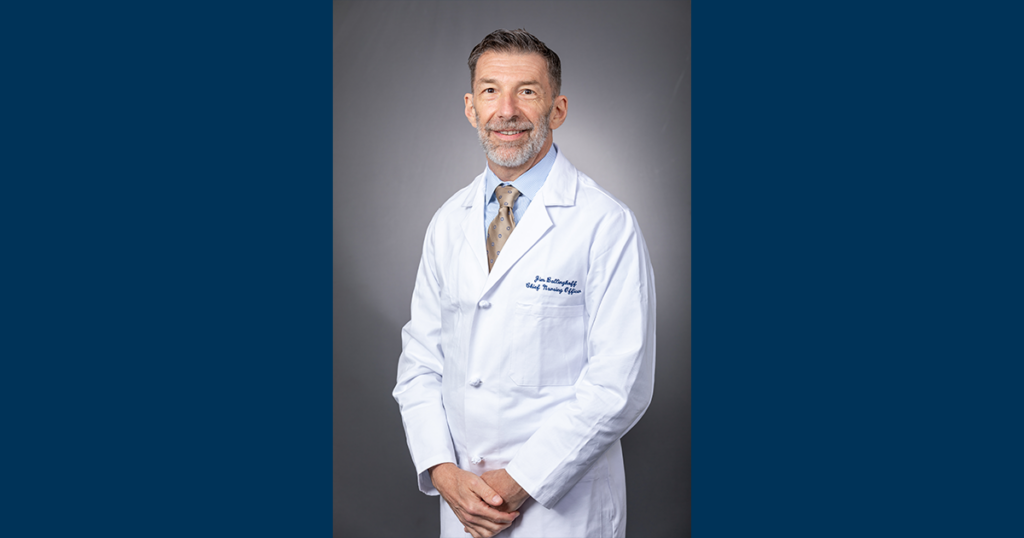La Salle University
From the casinos of Atlantic City to Penn Medicine, this La Salle alumnus rolls the dice on a second career path.

James Ballinghoff, DNP, RN, ’03, ’06 MBA, MSN, wasn’t always chief nurse executive of University of Pennsylvania Health System–or even a nurse at all, for that matter.
Before entering healthcare, Ballinghoff worked in the hospitality industry.
“I was not ready at 18 to really identify what I wanted to do, which is why I started working full-time,” he said.
Right after graduating high school, Ballinghoff worked in the casinos for several years before getting his associate degree from Camden County College. There, he met a male nurse and asked extensively about his role. Ballinghoff had not been exposed to people in that field, nor had he considered the profession. But the long conversation sparked his interest. He moved on to Helene Fuld College of Nursing and worked full-time throughout his education.
“After that first class, I fell in love and knew it was going to be the right trajectory for me,” Ballinghoff said of nursing.
From there, he pursued the dual MSN/ MBA program at La Salle, where he was exposed to community nursing.
“La Salle is very engaged in its community; that was very inspiring for me,” he said. “Getting exposed to their mission was a great experience.”
Ballinghoff’s first job in his second career was a certified nursing assistant at Cooper University Hospital in New Jersey, and his first job as a graduate nurse was in the intensive care unit. When he moved on to Penn, he started in the cardiothoracic intensive care unit and then went on to manage the transplant and critical care units for a few years each, all while working on his dual master’s degrees.
Going to La Salle gave me the knowledge and skills–it basically gave me my whole career.
After graduation from La Salle in 2006, Ballinghoff was promoted to a director-level position in Penn Medicine’s home care and hospice services. He missed the acute care setting, so he transitioned to a director role back at Penn Presbyterian Medical Center in his areas of specialty: cardiology and critical care.
In 2012, Ballinghoff was promoted to chief nursing officer at Penn Presbyterian Medical Center and has served in that role for the past 11 years. That same year, Ballinghoff was honored with the 2012 Philadelphia Tri-State Nursing Excellence Award for Advancing and Leading the Profession, given by Nursing Spectrum magazine.
Ballinghoff holds other titles as well including vice president/chief nursing officer at Penn Presbyterian Medical Center and assistant dean for clinical practice at University of Pennsylvania School of Nursing. “Going to La Salle gave me the knowledge and skills–it basically gave me my whole career,” Ballinghoff said. “I became a top executive–chief nursing officer–just with those degrees.”
In 2013, La Salle’s nursing professors nominated Ballinghoff as the alumni keynote graduation speaker for the Graduate Commencement Ceremony. It was one of his proudest moments.
Most recently, Ballinghoff was promoted to chief nurse executive for the University of Pennsylvania Health System, where he now oversees nursing practice across the system. He works with chief nursing officers to build a positive work environment for staff to thrive, driving outcomes and creating a positive experience for Penn patients.
For people considering a second career, Ballinghoff—who became a registered nurse at 34—finds nursing to be a “great option.”
“In many ways you can bring that experience, knowledge, and skill from your first career, and in most cases, it will translate in some way to a nursing career,” he said.
The medical and hospitality industries aren’t entirely different, either.
“A lot of people will say the best nurses are the people who worked in the service industry,” Ballinghoff said, especially when it comes to serving others and mastering time management. “There are a lot of similarities you can bring along with you that makes you a stronger nurse.”
His advice for students interested in nursing: shadow a nurse to understand what the work entails and look into all the options the field offers.
“It’s one of the beauties of this profession: you can work for a pharmaceutical company, in a hospital, at a school, even a sporting arena,” Ballinghoff said. “It really is a wonderful career option.”
-Taylor Goebel